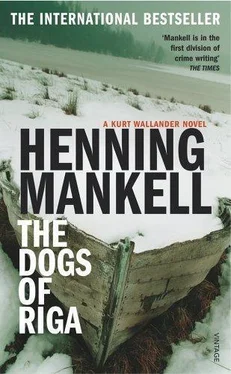"We'll have to get some help in identifying them," he said. "Photographs, fingerprints, clothes." "And a tattoo. A scimitar." "A scimitar?"
"Yes, a scimitar."
Björk shook his head and reached for the phone. "Just a minute," Wallander said. Björk withdrew his hand.
"I'm thinking about the man who telephoned," Wallander said. "According to Martinsson, he had a local accent. We should try to trace him."
"Have we any clues?"
"None. That's precisely why I suggest we put out an appeal. We can keep it general. We can appeal for anybody who's seen a red rubber boat drifting around, and ask them to get in touch with the police."
Björk nodded. "I'll have to speak to the press in any case. Reporters started ringing ages ago. How they can find out so quickly about what happens on a deserted stretch of beach is beyond me. It took them precisely half an hour yesterday."
"You know we have leaks," Wallander said, reminded once again of the double murder at Lenarp.
"What do you mean, we?"
"The police. The Ystad police."
"Who does the leaking?"
"How am I supposed to know that? It ought to be your job to remind all staff to be discreet and observe professional secrecy."
Björk slammed his fist down on his desk, as if administering a box on the ears. But he didn't answer Wallander directly.
"We'll make an appeal," was all he said. "At midday, before the news on the radio. I want you to be at the press conference. Right now I must call Stockholm and get some instructions."
Wallander got to his feet. "It would be great if we didn't have to," he said.
"Didn't have to do what?" "Find whoever shot the men in the life-raft." "1*11 find out what Stockholm has to say," Björk said, shaking his head.
Wallander left the room. Martinsson's and Svedberg's offices were still empty. He glanced at his watch: nearly 9.30 a.m. He went down to the basement of the police station where the life-raft had been placed on wooden trestles. He used a strong torch to examine it thoroughly, looking for the name of a firm or country of manufacture, but he found nothing, which surprised him. He couldn't come up with a satisfactory explanation for why that should be. He went round the rubber boat once more, and this time noticed a short piece of rope. It was different from the rope holding the wooden floor in place. It had been cut off with a knife. He tried to imagine what conclusions Rydberg would have drawn, but his mind was a complete blank.
He was back in his office by 10 a.m. Neither Martinsson nor Svedberg answered when he phoned their rooms. He pulled over a notebook and started to write out a summary of the little they knew about the two dead men. People from the Eastern bloc, shot through the heart at close range, then dressed in their jackets and dumped in a life-raft that still hadn't been identified. Plus, the men had been tortured. He pushed the notebook away: a thought had suddenly struck him. Men who've been tortured and murdered, he thought: you hide the bodies away, dig graves for them, or send them to the bottom of the sea with iron weights attached to their legs. If you load them into a life-raft, the likelihood is that they will be found.
Can that have been the intention? That they would be found? Doesn't the life-raft suggest the murder took place on board a ship? He crumpled up the top page of the notebook and threw it into the wastepaper basket. I don't know enough, he thought. Rydberg would have told me not to be impatient.
The phone rang. It was 10.45 a.m. The moment he heard his father's voice, he remembered that he was supposed to go and see him. He should have been in Löderup by 10 a.m. so they could drive to a shop in Malmö to buy canvases and paints.
"Why haven't you come?" his father asked angrily.
Wallander decided to be perfectly straight with him.
"I'm sorry," he said. "I'd forgotten all about it."
There was a long pause.
"At least that's an honest answer," his father said finally.
"I can come tomorrow," Wallander said.
"Make it tomorrow, then," his father said, and hung up.
Wallander wrote a note on a piece of paper and fastened it to the telephone. He'd better not forget tomorrow.
He rang Svedberg: still no reply. Martinsson answered, though – he'd just come back to his office. Wallander went out into the corridor to meet him.
"Do you know what I've discovered today?" Martinsson asked. "That it's more or less impossible to describe what a life-raft looks like. All different models made by different manufacturers look the same. Only experts can tell them apart. So I went to Malmö and I've been visiting the various importers."
They had gone to the canteen to fetch some coffee. Martinsson got some biscuits, and they went to Wallander's office.
"So, now you know all about life-rafts," Wallander said. "Quite a bit, but I don't know where this one comes from."
"It's odd that there isn't any logo or a notice of country of manufacture," Wallander said. "Life-saving equipment is generally covered in all kinds of notes and instructions."
"I agree. So did the importers in Malmö. But there is the possibility of a solution: the coastguard. Captain Österdahl, a retired officer who has devoted his whole life to working on the Customs boats -15 years in Arkösund, 10 years in the Gryt archipelago. After that he moved to Simrishamn, and was based there until he retired. Over the years he drew up his own register of different types of vessel, including rubber boats and life-rafts."
"Who told you this?"
"I struck it lucky when I called the coastguard. The man who answered had worked on one of the Customs boats that Österdahl skippered."
"Good," said Wallander. "Maybe he can help us."
"If he can't, then nobody can," Martinsson said philosophically. "He lives out at Sandhammaren. I thought I'd drive out and fetch him so that he can take a look at the boat. Have there been any developments?"
Wallander told him Mörth's conclusions while he listened attentively.
"So we may have to co-operate with the Russian police," he said when Wallander had finished. "Can you speak Russian?"
"Not a word. Mind you, it might mean that we can drop the whole business."
"No harm in hoping."
Martinsson suddenly became thoughtful.
"That's the way I feel sometimes, in fact," he said after a while. "That I wish we could just drop certain criminal cases. Because they're so awful. Too bloody and unreal.
When I was at police college, we didn't learn how to cope with tortured corpses abandoned in life-rafts. It's as if developments in crime have left me behind. And I'm only 30."
In recent years Kurt Wallander had often felt the same way as Martinsson. It had become more difficult to be a police officer. They were living at a time characterised by a sort of criminality that nobody had experienced before. It was a myth that a lot of police officers left the force in order to become security guards or work for private firms for financial reasons. The truth was that most police officers that left the force did so on grounds of insecurity.
"Maybe we ought to go and see Björk and request advanced training in how to deal with tortured humans," Martinsson said.
Wallander knew that there was nothing cynical in what Martinsson was saying, just the insecurity he himself often felt.
"Every generation of police officers seems to say the same thing," he said. "We're no exception."
"I can't remember Rydberg ever complaining, can you?"
"Rydberg was an exception. But I'd like to ask you something before you go. The man who phoned. There was nothing to suggest he might be a foreigner, was there?"
Martinsson had no doubt.
"Nothing at all. He came from around here. Full stop." "Has anything else struck you about that conversation?" "No."
Читать дальше












